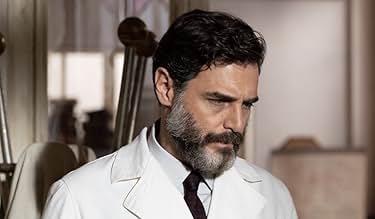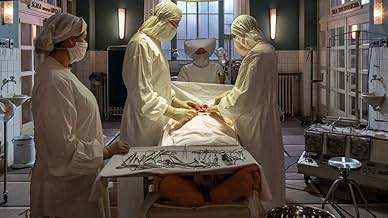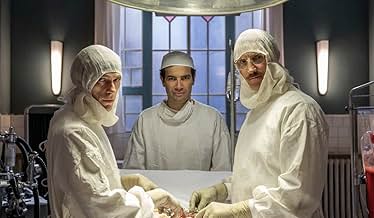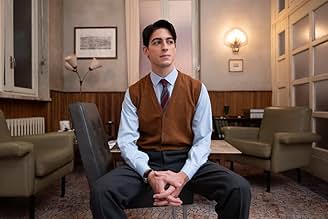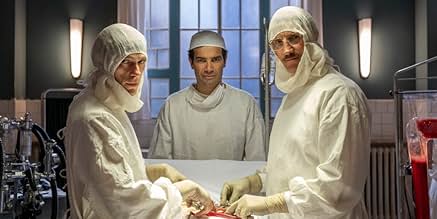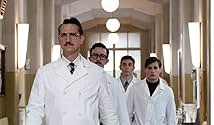Cuori
- Série de TV
- 2021–
- 50 min
Adicionar um enredo no seu idiomaDreams, ambitions and love inhabit the heart surgery department of the Le Molinette hospital in Turin, at the end of the 1960s. The head physician Cesare Corvara creates a team capable of ca... Ler tudoDreams, ambitions and love inhabit the heart surgery department of the Le Molinette hospital in Turin, at the end of the 1960s. The head physician Cesare Corvara creates a team capable of carrying out the first heart transplant in history.Dreams, ambitions and love inhabit the heart surgery department of the Le Molinette hospital in Turin, at the end of the 1960s. The head physician Cesare Corvara creates a team capable of carrying out the first heart transplant in history.
Explorar episódios
Enredo
Avaliação em destaque
RAI was airing publicity spots for this series for well over two months, and I was curious about it mostly because they already had a brand new show centered around a heart surgeon (Fino all'ultimo battito) and such a similar theme twice a week on Rai1 would look like an excess.
In those spots, the focus was on the trendy politically correct narrative of "acceptance and empowerment of women in the work place" as what they chose to showcase was a nun/nurse that objected to our female protagonist's mini skirt.
In a nutshell, the show is set in Turin in 1967. A female cardiologist (Pilar Fogliati) returns to Italy after having studied and excelled in Houston. And she is to marry the chief surgeon of the leading hospital, unbeknownst to her ex-fiancee who is part of the surgical team there.
As opposed to the publicity spots, I will choose to focus not on the retro-wokeish PC/SJW aspect and praise the show a bit as a medical fiction.
For me, the highlight was the surgery method depicted in the end of the 2nd episode. They operated a young bride while using the groom's heart as he volunteered to support her blood flow during the surgery which would pose much higher risk as the girl's body could not withstand such an intervention.
Now, this was both interesting and puzzling for me. Because, when doctors proposed this method to the family, both her mom and father volunteered, and then the groom stepped in. At no point, there was mention of competency of blood groups or some other determining criteria. Given the show is heavily based on medical facts (the chief surgeon is eager to have the world's first heart transplant made in his hospital etc.) they could not have made this up. And it was such a strong theme, especially because the families of the bride and groom had been litigating (over suspicion of virginity, also) till that point in the story. It really was interesting and noble, as our protagonist noted, that one spouse's heart was "literally" beating for the other during the procedure.
Had I been the script supervisor for this show, I'd have provided more focus and attention on the "medical story" of that 2nd episode, rather than invest uselessly on the worn out subject of a successful woman being dismissed in the work place as both her colleagues and the patients had trust issues. (Given the fact that her soon-to-be husband had transferred her, the suspicions did not really sound so unwarranted already, even though we were to discover she had some hyper-sensitive ears that could effectively help with diagnostics.)
Overall, I liked the show more than I thought I would. And this is mostly thanks to the effort on making it a convincing period piece. That aspect is well-managed as we do get into the feel and look of the late 60s. However, the lighting was a bit off. It threw the shade of a "made-for-TV" cheapness over the decor and even the acting. Yep, this is what it is in the end, made for TV... Still, there have been other RAI shows that outgrew that aspect visually, like "Il Commissario Ricciardi" that succesfully recreated the pre-WW2 Naples with high quality frames by use of cinema-quality lighting.
Had the lighting mentality and standards for "Cuori" been set higher, they could have come up with more notable scenes which could compete with "Once Upon a Time in Hollywood", which was the latest masterpiece covering the late 60s.
The success of "House MD" is still pretty much alive all over the world, and particulary in Italy where medical fiction roars with series like "DOC nelle tue mani" and "Fino all'ultimo battito". And this latest example ain't bad at all. However, certain aspects like leaning too much on PC messaging, soap opera-esque love triangles, and lame lighting, steal away from its potential success.
That is why I believe a sharper focus on the "medical" face of it would have helped more than rubbing into people's faces how brave it was for women cardiologists to wear mini skirts 60 years back... Nah... Their actual bravery was not there, and the packaging of this series is making the viewer miss this essential point.
For now, the show seems to deserve a solid 6, but I will withhold my score till I see more episodes.
In those spots, the focus was on the trendy politically correct narrative of "acceptance and empowerment of women in the work place" as what they chose to showcase was a nun/nurse that objected to our female protagonist's mini skirt.
In a nutshell, the show is set in Turin in 1967. A female cardiologist (Pilar Fogliati) returns to Italy after having studied and excelled in Houston. And she is to marry the chief surgeon of the leading hospital, unbeknownst to her ex-fiancee who is part of the surgical team there.
As opposed to the publicity spots, I will choose to focus not on the retro-wokeish PC/SJW aspect and praise the show a bit as a medical fiction.
For me, the highlight was the surgery method depicted in the end of the 2nd episode. They operated a young bride while using the groom's heart as he volunteered to support her blood flow during the surgery which would pose much higher risk as the girl's body could not withstand such an intervention.
Now, this was both interesting and puzzling for me. Because, when doctors proposed this method to the family, both her mom and father volunteered, and then the groom stepped in. At no point, there was mention of competency of blood groups or some other determining criteria. Given the show is heavily based on medical facts (the chief surgeon is eager to have the world's first heart transplant made in his hospital etc.) they could not have made this up. And it was such a strong theme, especially because the families of the bride and groom had been litigating (over suspicion of virginity, also) till that point in the story. It really was interesting and noble, as our protagonist noted, that one spouse's heart was "literally" beating for the other during the procedure.
Had I been the script supervisor for this show, I'd have provided more focus and attention on the "medical story" of that 2nd episode, rather than invest uselessly on the worn out subject of a successful woman being dismissed in the work place as both her colleagues and the patients had trust issues. (Given the fact that her soon-to-be husband had transferred her, the suspicions did not really sound so unwarranted already, even though we were to discover she had some hyper-sensitive ears that could effectively help with diagnostics.)
Overall, I liked the show more than I thought I would. And this is mostly thanks to the effort on making it a convincing period piece. That aspect is well-managed as we do get into the feel and look of the late 60s. However, the lighting was a bit off. It threw the shade of a "made-for-TV" cheapness over the decor and even the acting. Yep, this is what it is in the end, made for TV... Still, there have been other RAI shows that outgrew that aspect visually, like "Il Commissario Ricciardi" that succesfully recreated the pre-WW2 Naples with high quality frames by use of cinema-quality lighting.
Had the lighting mentality and standards for "Cuori" been set higher, they could have come up with more notable scenes which could compete with "Once Upon a Time in Hollywood", which was the latest masterpiece covering the late 60s.
The success of "House MD" is still pretty much alive all over the world, and particulary in Italy where medical fiction roars with series like "DOC nelle tue mani" and "Fino all'ultimo battito". And this latest example ain't bad at all. However, certain aspects like leaning too much on PC messaging, soap opera-esque love triangles, and lame lighting, steal away from its potential success.
That is why I believe a sharper focus on the "medical" face of it would have helped more than rubbing into people's faces how brave it was for women cardiologists to wear mini skirts 60 years back... Nah... Their actual bravery was not there, and the packaging of this series is making the viewer miss this essential point.
For now, the show seems to deserve a solid 6, but I will withhold my score till I see more episodes.
- muratmihcioglu
- 17 de out. de 2021
- Link permanente
Principais escolhas
Faça login para avaliar e ver a lista de recomendações personalizadas
- How many seasons does All Heart have?Fornecido pela Alexa
Detalhes
- Data de lançamento
- País de origem
- Centrais de atendimento oficiais
- Idioma
- Também conhecido como
- All Heart
- Empresa de produção
- Consulte mais créditos da empresa na IMDbPro
- Tempo de duração50 minutos
- Cor
Contribua para esta página
Sugerir uma alteração ou adicionar conteúdo ausente


